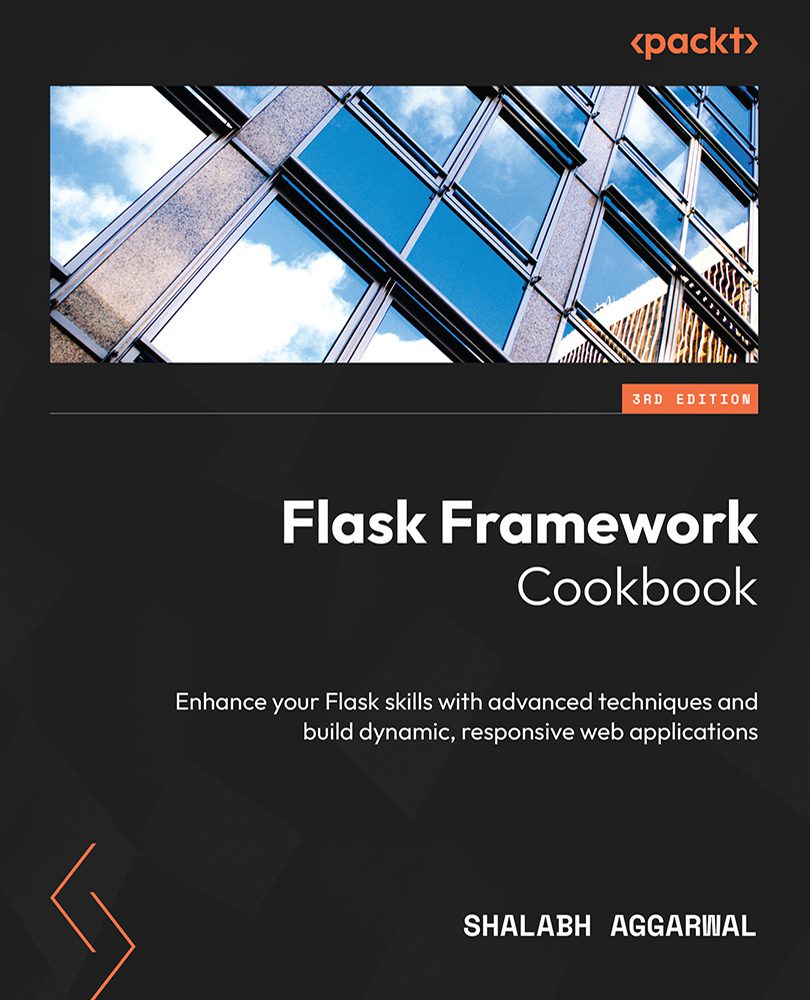Shalabh Aggarwal is the author of Flask Framework Cookbook; we got the chance to sit down and find out more about his experience of writing with Packt.
Q: What is the name of your book?
Shalabh: Flask Framework Cookbook
Q: What are your specialist tech areas?
Shalabh: Python, System Design, Software Architecture
Q: How did you become an author for Packt? Tell us about your journey. What was your motivation for writing this book?
Shalabh: Around a decade back (in early 2014), Packt approached me to author their first-ever book on the Flask framework. Back then, I was very active in open-source communities, especially the Flask community. I researched about the existing literature on Flask but since it was a young and emerging framework back then, the availability of resources was limited. The situation was even more dismal in case someone wanted a full-fledged guide to app building using Flask. Since I was already using Flask vastly for everything that I was building, it was a no-brainer to give back something to the developer community.
Q: What kind of research did you do, and how long did you spend researching before beginning the book?
Shalabh: I was actively building some interesting and innovative applications using Flask when Packt reached out to author the first edition. Most of the topics came right from the top of my head and everything was focused on adding topics that are most used by developers. I read through a lot of community posts and queries to figure out the areas that faced a lack of available help. It took me a month or so to come up with the list of topics that I wanted to cover.
Q: Did you face any challenges during the writing process? How did you overcome them?
Shalabh: Writing a book is a very time-consuming process, especially research-based writing. It is particularly taxing on family and friends because it is their time that gets sacrificed the most while an author is away writing. In short, it is a selfish endeavor that requires a lot of patience and support from people around you.
Q: What’s your take on the technologies discussed in the book? Where do you see these technologies heading in the future?
Shalabh: Although the book focuses on the Flask framework it does cover a ton of other technologies also that integrate with Flask. I have been writing about these for almost a decade now and the technologies that have kept up with the new trends have moved up in the world. The pattern would remain the same in the future. Flask as a framework will continue evolving as a favored one and will find a lot of application in AI-enabled systems.
Q: Why should readers choose this book over others already on the market? How would you differentiate your book from its competition?
Shalabh: Flask framework cookbook has been perfected over almost a decade with its 3rd edition out now. The book series has seen almost nil errors since its inception and has been quoted in multiple university curriculum and research papers across the globe. The cookbook approach allows for an easy read and also helps the readers to focus directly on the area of concern rather than reading through the whole content.
Q: What are the key takeaways you want readers to come away with from the book?
Shalabh: Ability to build web applications from scratch using Flask as the web framework. Develop knowledge and confidence in all aspects of application development, testing, deployment, and post-deployment.
Q. What advice would you give to readers jumping into this technology? Do you have any top tips?
Shalabh: Flask is a micro-framework so do not expect a lot of batteries included. This means that it allows for as much flexibility as possible but takes a bit of time to build ancillary features like admin, authentication, etc. that you would usually get packaged with other popular frameworks like Django.
Q. Do you have a blog that readers can follow?
Shalabh: Not as of now
Q: Can you share any blogs, websites, and forums to help readers gain a holistic view of the tech they are learning? What are the key takeaways you want readers to come away with from the book?
Shalabh: Official documentation of the Flask framework will prove to be very helpful.
Q. How would you describe your author’s journey with Packt? Would you recommend Packt to aspiring authors?
Shalabh: Having been associated with Packt for the last 9-10 years, the experience has been great. Everything, right from inception to final publishing is well-planned and organized.
Q. Do you belong to any tech community groups?
Shalabh: Associated with Python, Flask, and OpenStack communities.
Q. What are your favorite tech journals? How do you keep yourself up to date on tech?
Shalabh: Medium and Hackernoon are my go-to journals on tech. I like to experiment with new technologies by myself a lot.
Q. How did you organize, plan, and prioritize your work and write the book?
Shalabh: I would usually work on the book during my non-working hours, i.e. late nights on weekdays or weekends. I was also to pull a lot of weight on the book during long holidays.
Q. What is that one writing tip that you found most crucial and would like to share with aspiring authors?
Shalabh: Whenever you are writing something, read it yourself casually. If you have to read it twice to make sense of what you wrote, then it can always be simplified further.
Q. Would you like to share your social handles? If so, please share.
Shalabh: LinkedIn
You can find Shalabh’s book on Amazon by following this link: Please click here









